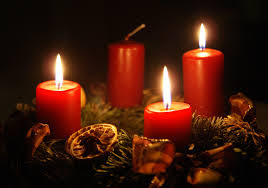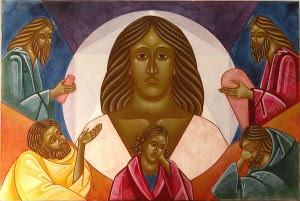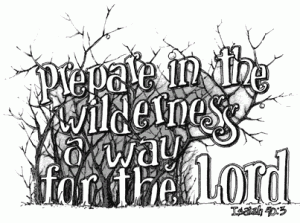 Today's gospel is the story of the Annunciation by Gabriel to Mary. But today I would like to talk of two Annunciations, Mary's and the one to Zechariah, the father of John the Baptist. What we see are two different responses to a messenger of God. Zechariah was the skeptic and supposedly the realist who said his wife was old and barren well beyond the age of child-bearing. For him it was open and shut, impossible. On the other hand Mary had an open heart and mind. She was curious as to how it could happen. She could accept that God could do it, even though much of her wonderment and curiosity went unanswered. She basically said what in our parlance would be “whatever” and went on to face the eventualities that would occur. Zechariah was struck dumb as a reminder of his inability to speak to God and probably for his demeanor in the holy of holies where he Today's gospel is the story of the Annunciation by Gabriel to Mary. But today I would like to talk of two Annunciations, Mary's and the one to Zechariah, the father of John the Baptist. What we see are two different responses to a messenger of God. Zechariah was the skeptic and supposedly the realist who said his wife was old and barren well beyond the age of child-bearing. For him it was open and shut, impossible. On the other hand Mary had an open heart and mind. She was curious as to how it could happen. She could accept that God could do it, even though much of her wonderment and curiosity went unanswered. She basically said what in our parlance would be “whatever” and went on to face the eventualities that would occur. Zechariah was struck dumb as a reminder of his inability to speak to God and probably for his demeanor in the holy of holies where he  was at the time. was at the time.
Much throughout history has been made of Mary being a virgin. Yet when all being said and done, it was not an issue of sexuality, but ultimately a question of fatherhood of Jesus the Savior. Jesus was fully human, a man like any other, yet he was conceived and fathered by God himself who chose a young virgin, untouched and faithful and open to God. She was the first to fully contain the very body and blood of Jesus Christ. She was new and fresh and young and ready. Her consent and God's action showed Christ's uniqueness and humanity as well as his divine nature. His conception was to be fully human, yet it was an act of God, not of man. Even we, when we begin something new, prepare and clean and start afresh whatever we do. Sexuality was not really a question to God. Our vision of it is often shaded by a sense that something is shameful or wrong about it. Humanity so often has taken and twisted what is truly God's gift to the expression of human love. How could this be since God gave us nothing bad, only we by our own choice can make it bad. Human love is founded in God's love and is a good thing unless we somehow abuse or twist it ourselves.
Like Mary today we should have a simple faith and open heart ready to hear God's call. Christ comes to us probably not as Gabriel came to Mary,
 but through the Spirit we have received, he is in us and calls us and guides us. Just as Mary received Jesus, so can we receive Jesus not only as we celebrate Christmas, but he comes to us in each Eucharist we celebrate. We too can receive him often and make him part of our body and our blood in the Eucharist we receive. Let us not forget He with us now. He is present to show us the way. but through the Spirit we have received, he is in us and calls us and guides us. Just as Mary received Jesus, so can we receive Jesus not only as we celebrate Christmas, but he comes to us in each Eucharist we celebrate. We too can receive him often and make him part of our body and our blood in the Eucharist we receive. Let us not forget He with us now. He is present to show us the way. |
Sunday, December 21, 2014
Advent Reflection
Saturday, December 20, 2014
Advent Reflection
First reading of the day:
Isaiah 7:10-14
The LORD spoke to Ahaz: Ask for a sign from the LORD, your God; let it be deep as the nether world, or high as the sky! But Ahaz answered, “I will not ask! I will not tempt the LORD!” Then Isaiah said: Listen, O house of David! Is it not enough for you to weary men, must you also weary my God? Therefore the Lord himself will give you this sign: the virgin shall conceive and bear a son, and shall name him Emmanuel.
Gospel reading of the day:
Luke 1:26-38
In the sixth month, the angel Gabriel was sent from God to a town of Galilee called Nazareth, to a virgin betrothed to a man named Joseph, of the house of David, and the virgin’s name was Mary. And coming to her, he said, “Hail, full of grace! The Lord is with you.” But she was greatly troubled at what was said and pondered what sort of greeting this might be. Then the angel said to her, “Do not be afraid, Mary, for you have found favor with God. Behold, you will conceive in your womb and bear a son, and you shall name him Jesus. He will be great and will be called Son of the Most High, and the Lord God will give him the throne of David his father, and he will rule over the house of Jacob forever, and of his Kingdom there will be no end.”
 But Mary said to the angel, “How can this be, since I have no relations with a man?” And the angel said to her in reply, “The Holy Spirit will come upon you, and the power of the Most High will overshadow you. Therefore the child to be born will be called holy, the Son of God. And behold, Elizabeth, your relative, has also conceived a son in her old age, and this is the sixth month for her who was called barren; for nothing will be impossible for God.” But Mary said to the angel, “How can this be, since I have no relations with a man?” And the angel said to her in reply, “The Holy Spirit will come upon you, and the power of the Most High will overshadow you. Therefore the child to be born will be called holy, the Son of God. And behold, Elizabeth, your relative, has also conceived a son in her old age, and this is the sixth month for her who was called barren; for nothing will be impossible for God.”
Mary said, “Behold, I am the handmaid of the Lord. May it be done to me according to your word.” Then the angel departed from her.
Reflection on the readings: God is tricky: the Lord of surprise and master of the expected. When Isaiah uttered his prophecy, he almost certainly did not appreciate the deepest meaning of what he was saying; he was telling Ahaz that God was faithful and a new king, Ahaz's son Hezekiah, was to be born. But the words echoed in a small town of Galilee centuries later when a young girl said yes to God's plan. God is the God of the big picture. Pointillism is a technique of painting in which small, distinct dots of color are applied in patterns to form an image. When viewed close up, the points are indecipherable, but viewed at a distance, the painting is intelligible and full of meaning. God is the great pointillist. Isaiah, Ahaz, Hezekiah, Mary, you, me--we are dots of color on this huge canvas God is painting. What we shall become is only to be revealed at a distance: we cannot know now what surprise God is creating. Advent is the season of expectancy: what we are waiting for is coming but all we can know is that it will surprise us when it arrive.
|
Friday, December 19, 2014
Advent Reflection
First reading of the day:
There was a certain man from Zorah, of the clan of the Danites, whose name was Manoah. His wife was barren and had borne no children. An angel of the LORD appeared to the woman and said to her, “Though you are barren and have had no children, yet you will conceive and bear a son. Now, then, be careful to take no wine or strong drink and to eat nothing unclean. As for the son you will conceive and bear, no razor shall touch his head, for this boy is to be consecrated to God from the womb. It is he who will begin the deliverance of Israel from the power of the Philistines.” The woman went and told her husband, “A man of God came to me; he had the appearance of an angel of God, terrible indeed. I did not ask him where he came from, nor did he tell me his name. But he said to me, ‘You will be with child and will bear a son. So take neither wine nor strong drink, and eat nothing unclean. For the boy shall be consecrated to God from the womb, until the day of his death.’” The woman bore a son and named him Samson. The boy grew up and the LORD blessed him; the Spirit of the LORD stirred him.
Gospel reading of the day:
Luke 1:5-25
In the days of Herod, King of Judea, there was a priest named Zechariah of the priestly division of Abijah; his wife was from the daughters of Aaron, and her name was Elizabeth. Both were righteous in the eyes of God, observing all the commandments and ordinances of the Lord blamelessly. But they had no child, because Elizabeth was barren and both were advanced in years.
Once when he was serving as priest in his division’s turn before God, according to the practice of the priestly service, he was chosen by lot to enter the sanctuary of the Lord to burn incense. Then, when the whole assembly of the people was praying outside at the hour of the incense offering, the angel of the Lord appeared to him, standing at the right of the altar of incense. Zechariah was troubled by what he saw, and fear came upon him.
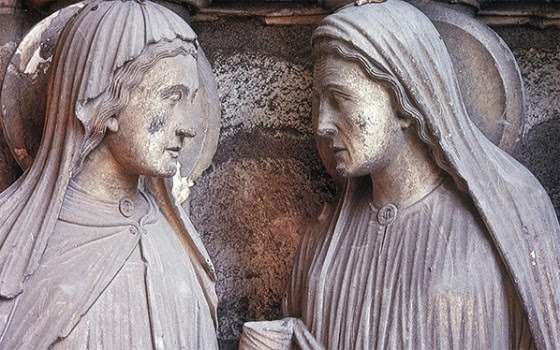 But the angel said to him, “Do not be afraid, Zechariah, because your prayer has been heard. Your wife Elizabeth will bear you a son, and you shall name him John. And you will have joy and gladness, and many will rejoice at his birth, for he will be great in the sight of the Lord. He will drink neither wine nor strong drink. He will be filled with the Holy Spirit even from his mother’s womb, and he will turn many of the children of Israel to the Lord their God. He will go before him in the spirit and power of Elijah to turn the hearts of fathers toward children and the disobedient to the understanding of the righteous, to prepare a people fit for the Lord.”
Then Zechariah said to the angel, “How shall I know this? For I am an old man, and my wife is advanced in years.” And the angel said to him in reply, “I am Gabriel, who stand before God. I was sent to speak to you and to announce to you this good news. But now you will be speechless and unable to talk until the day these things take place, because you did not believe my words, which will be fulfilled at their proper time.” Meanwhile the people were waiting for Zechariah and were amazed that he stayed so long in the sanctuary. But when he came out, he was unable to speak to them, and they realized that he had seen a vision in the sanctuary. He was gesturing to them but remained mute.
Then, when his days of ministry were completed, he went home. After this time his wife Elizabeth conceived, and she went into seclusion for five months, saying, “So has the Lord done for me at a time when he has seen fit to take away my disgrace before others.”
Reflection on the readings: Advent is nothing if it is not the season of hope. The central figures in both of the readings today are women who have aged too far to give birth to children. In both readings, an angel announces that God has chosen these women to bear offspring with special missions. In both these cases, God defies every natural expectation and turns lives that were winding down into fresh and enexpected adventures.
All of us enter periods in our lives when our creativity diminishes, and we are certain we have nothing more to give. The readings, and the season of Advent itself, tell a very different story about our temptation to despair. When we are sure that time has passed us by, and we are certain we are finished and nothing more will change, God is always prepared to make everything new again. God is never finished with us until we have breathed our last, and even then, God continues to renew the world we have left behind with the lessons inherent in our lives.
|
Thursday, December 18, 2014
Advent Reflection
First reading of the day:
Jeremiah 23:5-8
Behold, the days are coming, says the LORD, when I will raise up a righteous shoot to David; as king he shall reign and govern wisely, he shall do what is just and right in the land. In his days Judah shall be saved, Israel shall dwell in security. This is the name they give him: “The LORD our justice.”
Therefore, the days will come, says the LORD, when they shall no longer say, “As the LORD lives, who brought the children of Israel out of the land of Egypt”; but rather, "As the LORD lives, who brought the descendants of the house of Israel up from the land of the north and from all the lands to which I banished them"; they shall again live on their own land.
Gospel reading of the day:
Matthew 1:18-25
This is how the birth of Jesus Christ came about. When his mother Mary was betrothed to Joseph, but before they lived together, she was found with child through the Holy Spirit. Joseph her husband, since he was a righteous man, yet unwilling to expose her to shame, decided to divorce her quietly. Such was his intention when, behold, the angel of the Lord appeared to him in a
 dream and said, “Joseph, son of David, do not be afraid to take Mary your wife into your home. For it is through the Holy Spirit that this child has been conceived in her. She will bear a son and you are to name him Jesus, because he will save his people from their sins.” All this took place to fulfill what the Lord had said through the prophet: dream and said, “Joseph, son of David, do not be afraid to take Mary your wife into your home. For it is through the Holy Spirit that this child has been conceived in her. She will bear a son and you are to name him Jesus, because he will save his people from their sins.” All this took place to fulfill what the Lord had said through the prophet:
Behold, the virgin shall be with child and bear a son, and they shall name him Emmanuel,
which means “God is with us.” When Joseph awoke, he did as the angel of the Lord had commanded him and took his wife into his home. He had no relations with her until she bore a son, and he named him Jesus.
Reflection on the gospel reading: Under Jewish law, Joseph as Mary's betrothed had a right to sexual relations with Mary. Mary is pregnant, and though the neighbors likely suspect nothing, Joseph knows he is not the baby's father. Joseph, of course, is horrified, and within his cultural milieu, marrying a woman capable of such a thing is unthinkable to him. But Joseph is a good man, and he doesn't want harm to come to Mary. Accordingly, he decides to quietly end the engagement with Mary and move on with his life.
God, of course, has other ideas. He sends word to Joseph in a dream that the baby has a unique origin. Joseph now must put faith in his dream. Joseph, the man of faith, does that. And out of Joseph's faith comes the fertile ground for the world's salvation; indeed, the name given the baby by the angel in the dream, Joshua (rendered Jesus in Greek, the language of the New Testament), means, Yahweh saves. And thus it is, as the Prophet Jeremiah foretold, that in his days Judah shall be saved, Israel shall dwell in security.
And so it is true with us that whenever we choose to put our faith in God we dwell in security.
|
Wednesday, December 17, 2014
Obedience Is the Secret to Joy
BY RICK WARREN — DECEMBER 15, 2014
“Let us test and examine our ways. Let us turn back to the Lord.”(Lamentations 3:40 NLT)
Joy is an easy thing to lose, but it’s also an easy thing to get back. After you admit that you’ve lost your joy, you need to analyze the cause. You have to look at your life and ask yourself, “How did I lose my joy? What is robbing my joy?”
The Bible tells us many times in Scripture to examine our lives. Lamentations 3:40 says, “Let us test and examine our ways. Let us turn back to the Lord” (NLT).
There are hundreds of killjoys in life, but the two most common I see in people’s lives are an unbalanced schedule and unused talent. You have to have a balance between rest and work, input and output. And you have to use your unique, God-given talents, or you’re going to get frustrated. Take whatever percent of your talent that’s not being used in your job and use it for ministry. If you’re in a job that uses less than 25 percent of your talent, then get out.
Once you’ve figured out how you lost your joy, you need to correct what’s wrong.
Do you know what will rob your joy faster than anything else? When you know the right thing to do and you don’t do it.
The Bible says in James 4:17, “It is sin to know what you ought to do and then not do it.”
So let me ask you: What do you know you need to be doing but you’re not? What has God told you to do but you haven’t started doing yet?
The secret to continual, abundant, and overflowing joy is obedience. It’s doing what God tells you to do. Every time you do what God tells you to do, your life’s going to be filled with joy.
You’re also going to be filled with joy when you think about what’s good in your life. David says in Psalm 126:3, “The Lord has done great things for us, and we are filled with joy” (NIV). The more you focus on what God has done for you, the more joy you’re going to have in your life. Why? Because it produces gratitude. And the attitude of gratitude is the healthiest human emotion.
If you want to get your joy back, first you admit it’s gone, then you analyze the cause. Then, correct what’s wrong, and get an attitude of gratitude. Tomorrow we’ll talk about the last three steps to recovering your joy.
Talk It Over
- What do you need to do to balance your schedule so that it does not steal your joy?
- What has God told you to do but you haven’t started doing yet?
Advent Reflection
First reading of the day:
Genesis 49:2, 8-10
Jacob called his sons and said to them: “Assemble and listen, sons of Jacob, listen to Israel, your father. “You, Judah, shall your brothers praise-–your hand on the neck of your enemies; the sons of your father shall bow down to you. Judah, like a lion’s whelp, you have grown up on prey, my son. He crouches like a lion recumbent, the king of beasts–who would dare rouse him? The scepter shall never depart from Judah, or the mace from between his legs, While tribute is brought to him, and he receives the people’s homage.
Gospel reading of the day:
Matthew 1:1-17
The book of the genealogy of Jesus Christ, the son of David, the son of Abraham.
Abraham became the father of Isaac, Isaac the father of Jacob, Jacob the father of Judah and his brothers. Judah became the father of Perez and Zerah, whose mother was Tamar. Perez became the father of Hezron, Hezron the father of Ram, Ram the father of Amminadab. Amminadab became the father of Nahshon, Nahshon the father of Salmon, Salmon the father of Boaz, whose mother was Rahab. Boaz became the father of Obed, whose mother was Ruth. Obed became the father of Jesse, Jesse the father of David the king.
![st-joseph-and-christ-child-[1]](https://blogger.googleusercontent.com/img/proxy/AVvXsEixIm1G7HRyKYnyQdRASjT9hM8ADgDhxFVMGB36Tzxti10jODxvB1N686muv6e3u19WpYl8BBWAVNz0dyYWxqCXGcTHSWlmmRT6sxeQcMeaY_afea6C3kGkHkNylNYTHfRwFErPy_ishEbeFqXYelwHXSN95UYaNNVYDVCA4rhB0yLtbnaqWeBjly9R=s0-d-e1-ft) David became the father of Solomon, whose mother had been the wife of Uriah. Solomon became the father of Rehoboam, Rehoboam the father of Abijah, Abijah the father of Asaph. Asaph became the father of Jehoshaphat, Jehoshaphat the father of Joram, Joram the father of Uzziah. Uzziah became the father of Jotham, Jotham the father of Ahaz, Ahaz the father of Hezekiah. Hezekiah became the father of Manasseh, Manasseh the father of Amos, Amos the father of Josiah. Josiah became the father of Jechoniah and his brothers at the time of the Babylonian exile. David became the father of Solomon, whose mother had been the wife of Uriah. Solomon became the father of Rehoboam, Rehoboam the father of Abijah, Abijah the father of Asaph. Asaph became the father of Jehoshaphat, Jehoshaphat the father of Joram, Joram the father of Uzziah. Uzziah became the father of Jotham, Jotham the father of Ahaz, Ahaz the father of Hezekiah. Hezekiah became the father of Manasseh, Manasseh the father of Amos, Amos the father of Josiah. Josiah became the father of Jechoniah and his brothers at the time of the Babylonian exile.
After the Babylonian exile, Jechoniah became the father of Shealtiel, Shealtiel the father of Zerubbabel, Zerubbabel the father of Abiud. Abiud became the father of Eliakim, Eliakim the father of Azor, Azor the father of Zadok. Zadok became the father of Achim, Achim the father of Eliud, Eliud the father of Eleazar. Eleazar became the father of Matthan, Matthan the father of Jacob, Jacob the father of Joseph, the husband of Mary. Of her was born Jesus who is called the Christ.
Thus the total number of generations from Abraham to David is fourteen generations; from David to the Babylonian exile, fourteen generations; from the Babylonian exile to the Christ, fourteen generations.
Reflection on the readings: When Jesus entered human history, he entered it with all its ambiguities. The list of Jesus’ ancestors as Matthew presents it suggests that Jesus’ ancestors include not just holy men and women but also people who had committed sins as serious as murder and acted out of weaknesses as great as adultery. This list tells us that when God entered human history, God used both what is best and worst about us to do that. And that is the breathtakingly elegant and poetic commencement God’s redemption of humanity.
|
Tuesday, December 16, 2014
Advent Reflection
First reading of the day:
Zephaniah 3:1-2, 9-13
Thus says the LORD: Woe to the city, rebellious and polluted, to the tyrannical city! She hears no voice, accepts no correction; in the LORD she has not trusted, to her God she has not drawn near. For then I will change and purify the lips of the peoples, that they all may call upon the name of the LORD, to serve him with one accord; from beyond the rivers of Ethiopia and as far as the recesses of the North, they shall bring me offerings. On that day, you need not be ashamed of all your deeds, your rebellious actions against me; for then will I remove from your midst the proud braggarts, and you shall no longer exalt yourself on my holy mountain. But I will leave as a remnant in your midst a people humble and lowly, who shall take refuge in the name of the LORD: the remnant of Israel. They shall do no wrong and speak no lies; nor shall there be found in their mouths a deceitful tongue; they shall pasture and couch their flocks with none to disturb them.
Gospel reading of the day:
Matthew 21:28-32
Jesus said to the chief priests and the elders of the people: “What is your opinion? A man had two sons. He came to the first and said, ‘Son, go out and work in the vineyard today.’ The son said in reply, ‘I will not,’ but afterward he changed his mind and went.
 The man came to the other son and gave the same order. He said in reply, ‘Yes, sir,’ but did not go. Which of the two did his father’s will?” They answered, “The first.” Jesus said to them, “Amen, I say to you, tax collectors and prostitutes are entering the Kingdom of God before you. When John came to you in the way of righteousness, you did not believe him; but tax collectors and prostitutes did. Yet even when you saw that, you did not later change your minds and believe him.” The man came to the other son and gave the same order. He said in reply, ‘Yes, sir,’ but did not go. Which of the two did his father’s will?” They answered, “The first.” Jesus said to them, “Amen, I say to you, tax collectors and prostitutes are entering the Kingdom of God before you. When John came to you in the way of righteousness, you did not believe him; but tax collectors and prostitutes did. Yet even when you saw that, you did not later change your minds and believe him.”
Reflection on the readings: In the Sermon on the Mount, Jesus observes that it is not those who cry out, "Lord, Lord," who are saved. Neither are those who do mighty works in Jesus' name. Rather, the people who are saved are the people who do the Father's will. So which of the two sons did his Father's will, Jesus asks in today's gospel. Zephaniah says it is the one who became humble and low, taking refuge in the Lord: the one who was authentic and spoke no lies, the one who was naked before the Lord in the totality of reliance on God's mercy.
|
Monday, December 15, 2014
Advent Reflection
First reading of the day:
Numbers 24:2-7, 15-17a
When Balaam raised his eyes and saw Israel encamped, tribe by tribe, the spirit of God came upon him, and he gave voice to his oracle: The utterance of Balaam, son of Beor, the utterance of a man whose eye is true, the utterance of one who hears what God says, and knows what the Most High knows, of one who sees what the Almighty sees, enraptured, and with eyes unveiled: How goodly are your tents, O Jacob; your encampments, O Israel! They are like gardens beside a stream, like the cedars planted by the LORD. His wells shall yield free-flowing waters, he shall have the sea within reach; his king shall rise higher, and his royalty shall be exalted. Then Balaam gave voice to his oracle: The utterance of Balaam, son of Beor, the utterance of the man whose eye is true, the utterance of one who hears what God says, and knows what the Most High knows, of one who sees what the Almighty sees, enraptured, and with eyes unveiled. I see him, though not now; I behold him, though not near: A star shall advance from Jacob, and a staff shall rise from Israel.
Gospel reading of the day:
Matthew 21:23-27
When Jesus had come into the temple area, the chief priests and the elders of the people approached him as he was teaching and said, “By what authority are you doing these things? And who gave you this authority?” Jesus said to them in reply, “I shall ask you one question, and if you answer it for me, then I shall tell you by what authority I do these things. Where was John’s baptism from?
 Was it of heavenly or of human origin?” They discussed this among themselves and said, “If we say ‘Of heavenly origin,’ he will say to us, ‘Then why did you not believe him?’ But if we say, ‘Of human origin,’ we fear the crowd, for they all regard John as a prophet.” So they said to Jesus in reply, “We do not know.” He himself said to them, “Neither shall I tell you by what authority I do these things.” Was it of heavenly or of human origin?” They discussed this among themselves and said, “If we say ‘Of heavenly origin,’ he will say to us, ‘Then why did you not believe him?’ But if we say, ‘Of human origin,’ we fear the crowd, for they all regard John as a prophet.” So they said to Jesus in reply, “We do not know.” He himself said to them, “Neither shall I tell you by what authority I do these things.”
Reflection on the readings: Both of the readings invite the hearers of the prophetic word to consider how we see Jesus. Balaam sees clearly that Jacob will yield a son who will be a great king over the nations. In the gospel, when the chief priests and the elders of the people refuse to see God's hand in the work Jesus is doing, Jesus asks them if they can at least see God's hand in the work that John did. Full of calculation and guile, they claim they do not know. The readings ask us to take a stand, to say whether we are for Jesus or against him, but a noncommittal shrug of our shoulders, such as the one the chief priests and elders gave, does not engage the Lord.
|
Sunday, December 14, 2014
Advent Reflection
Third Sunday in Advent, Year B
First reading of the day:
Isaiah 61:1-2a, 10-11
The spirit of the Lord GOD is upon me, because the LORD has anointed me; he has sent me to bring glad tidings to the poor, to heal the brokenhearted, to proclaim liberty to the captives and release to the prisoners, to announce a year of favor from the LORD and a day of vindication by our God.
I rejoice heartily in the LORD, in my God is the joy of my soul; for he has clothed me with a robe of salvation and wrapped me in a mantle of justice, like a bridegroom adorned with a diadem, like a bride bedecked with her jewels.
 As the earth brings forth its plants, and a garden makes its growth spring up, so will the Lord GOD make justice and praise spring up before all the nations. As the earth brings forth its plants, and a garden makes its growth spring up, so will the Lord GOD make justice and praise spring up before all the nations.
Second reading of the day:
1 Thessalonians 5:16-24
Brothers and sisters: Rejoice always. Pray without ceasing. In all circumstances give thanks, for this is the will of God for you in Christ Jesus. Do not quench the Spirit. Do not despise prophetic utterances. Test everything; retain what is good. Refrain from every kind of evil.
May the God of peace make you perfectly holy and may you entirely, spirit, soul, and body, be preserved blameless for the coming of our Lord Jesus Christ. The one who calls you is faithful, and he will also accomplish it.
Gospel of the day:
John 1:6-8, 19-28
A man named John was sent from God. He came for testimony, to testify to the light, so that all might believe through him. He was not the light, but came to testify to the light.
And this is the testimony of John. When the Jews from Jerusalem sent priests and Levites to him to ask him, “Who are you?” He admitted and did not deny it, but admitted, “I am not the Christ.” So they asked him, “What are you then? Are you Elijah?” And he said, “I am not.” “Are you the Prophet?” He answered, “No.” So they said to him, “Who are you, so we can give an answer to those who sent us? What do you have to say for yourself?” He said: “I am the voice of one crying out in the desert, ‘make straight the way of the Lord,’” as Isaiah the prophet said.” Some Pharisees were also sent. They asked him, “Why then do you baptize if you are not the Christ or Elijah or the Prophet?” John answered them,
 “I baptize with water; but there is one among you whom you do not recognize, the one who is coming after me, whose sandal strap I am not worthy to untie.” This happened in Bethany across the Jordan, where John was baptizing. “I baptize with water; but there is one among you whom you do not recognize, the one who is coming after me, whose sandal strap I am not worthy to untie.” This happened in Bethany across the Jordan, where John was baptizing.
Reflection on the readings: People do not typically think of baptism when they think of Advent, but evidence from the history of the ancient church in Syria suggests the proper time for those faith communities to baptize was at the Epiphany. In the days and weeks leading up to the Epiphany, catechumens in the Syrian church who sought baptism fasted and prayed to prepare for initiation into the body of Christ. Advent might be a relic of this period of preparation for baptism. As time passed and baptism lost some of its association with Epiphany, people still had a sense that the period leading up to Christmas and Epiphany was a period of reflection, prayer, and fasting. When we do things like people who are preparing for baptism do-–things like prayer, fasting, almsgiving, or other spiritual disciplines-–we’re essentially preparing for baptism, and for those of us who already are baptized, we're seeking to deepen the meaning of our baptisms in our lives. The basic vocation of each baptized person is to help bring heaven’s reign to the world. The first reading from Isaiah includes the passage that Jesus reads when he unrolls the scroll in the synagogue of Nazareth as a sort of mission statement at the start of his ministry. But it is also a statement about who Jesus calls us to become in fulfilling our baptismal promises: people inspired by the empowering, liberating, eye-opening mission of Jesus for society and the world. The passage challenges us as baptized people to become alive, compassionate, merciful, honest, just, and authentic. Being women and men of action, however, is not our entire baptismal commitment. Paul counsels us to pray, and not just to pray but to pray unceasingly: As we renew our baptismal promises in Advent, we are to cultivate an awareness of God’s presence from moment to moment in our lives.
|
Saturday, December 13, 2014
Advent Reflection
|
Friday, December 12, 2014
Advent Relection
|
Wednesday, December 10, 2014
Advent Reflection
Wednesday of the Second Week of Advent, Cycle 1
First reading of the day:
Isaiah 40:25-31
To whom can you liken me as an equal? says the Holy One. Lift up your eyes on high and see who has created these things: He leads out their army and numbers them, calling them all by name. By his great might and the strength of his power not one of them is missing! Why, O Jacob, do you say, and declare, O Israel, “My way is hidden from the LORD, and my right is disregarded by my God”? Do you not know or have you not heard? The LORD is the eternal God, creator of the ends of the earth. He does not faint nor grow weary, and his knowledge is beyond scrutiny. He gives strength to the fainting; for the weak he makes vigor abound. Though young men faint and grow weary, and youths stagger and fall, they that hope in the LORD will renew their strength, they will soar as with eagles’ wings; they will run and not grow weary, walk and not grow faint.
Matthew 11:28-30
Jesus said to the crowds: “Come to me, all you who labor and are burdened, and I will give you rest. Take my yoke upon you and learn from me, for I am meek and humble of heart; and you will find rest for yourselves. For my yoke is easy, and my burden light.”
Reflection on the gospel of the day: Advent is an invitation to come to Jesus who says that if we will come, he will give us rest. Jesus never promises to remove our pain, but he does promise to never allow us to be alone in it. We may not always feel God's presence, but Isaiah tells us the Lord neither grows faint nor weary, that he knows each of by name, and Jesus tells us that God is never far away from us, particularly when circumstances in our lives trouble us.
|
Tuesday, December 09, 2014
Advent Reflection
First reading of the day:
Isaiah 40:1-11
Comfort, give comfort to my people, says your God. Speak tenderly to Jerusalem, and proclaim to her that her service is at an end, her guilt is expiated; Indeed, she has received from the hand of the LORD double for all her sins.
A voice cries out: In the desert prepare the way of the LORD! Make straight in the wasteland a highway for our God! Every valley shall be filled in, every mountain and hill shall be made low; the rugged land shall be made a plain, the rough country, a broad valley. Then the glory of the LORD shall be revealed, and all people shall see it together; for the mouth of the LORD has spoken.
A voice says, “Cry out!” I answer, “What shall I cry out?” “All flesh is grass, and all their glory like the flower of the field. The grass withers, the flower wilts, when the breath of the LORD blows upon it. So then, the people is the grass. Though the grass withers and the flower wilts, the word of our God stands forever.”
Go up onto a high mountain, Zion, herald of glad tidings; cry out at the top of your voice, Jerusalem, herald of good news! Fear not to cry out and say to the cities of Judah: Here is your God! Here comes with power the Lord GOD, who rules by his strong arm; here is his reward with him, his recompense before him. Like a shepherd he feeds his flock; in his arms he gathers the lambs, carrying them in his bosom,
Gospel reading of the day:
Matthew 18:12-14
Jesus said to his disciples: “What is your opinion? If a man has a hundred sheep and one of them goes astray, will he not leave the ninety-nine in the hills and go in search of the stray? And if he finds it, amen,
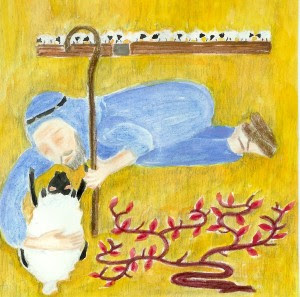 I say to you, he rejoices more over it than over the ninety-nine that did not stray. In just the same way, it is not the will of your heavenly Father that one of these little ones be lost.” I say to you, he rejoices more over it than over the ninety-nine that did not stray. In just the same way, it is not the will of your heavenly Father that one of these little ones be lost.”
Reflection on the gospel of the day: Our waiting for Jesus in Advent is a renewal of hope as the gospel reminds us that it is not the will of our heavenly Father that even one of us be lost. The evidence of God’s relationship to us and God's desire for our salvation is all around us. It is woven into the fabric of our lives that God is working to make us whole and happy. We only have to stop, look, and think, and we shall find God there, telling us things that we perhaps take for granted but things which are life affirming and life saving when we consider them in the awareness that not one of us is anything other than the keenest point of God's awareness and work. We watch and wait not for judgment and doom but for compassion and grace. Though the grass withers and the flower wilts, the word of our God stands forever.
|
Subscribe to:
Comments (Atom)



